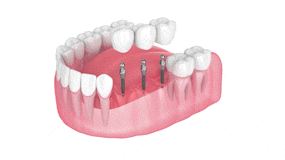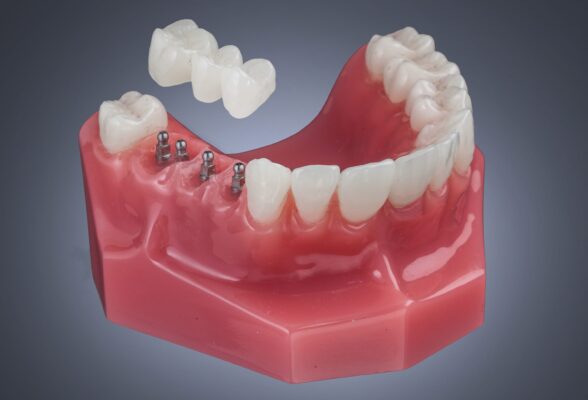Dental Bridges in East Longmeadow, MA
About 178 million adults in the United States have at least one missing tooth. Missing a tooth can cause alignment problems and jawbone loss and can affect your appearance, so getting prompt treatment is vital. One of the most popular ways to replace a missing tooth is a dental bridge. Learn what dental bridges are and why they can be a great choice.
What Are Dental Bridges?
A dental bridge is a device that covers the gap between two healthy teeth that have one or more missing teeth in the middle. The most common type of dental bridge rests on two crowns on either side of the gap, which holds up a false tooth. Dentists call this false tooth a “pontic.”
But there are many different options besides traditional fixed bridges, including:
- Maryland bridges
- Cantilever bridges
- Implant-supported bridges
 Maryland bridges can be a good option for those who have missing front teeth. They are supported by a metal framework with wings that bond to existing teeth, making them less visible when you smile.
Maryland bridges can be a good option for those who have missing front teeth. They are supported by a metal framework with wings that bond to existing teeth, making them less visible when you smile.
Cantilever bridges are similar to traditional bridges, but they require only one crown to hold the false tooth in place.
One of the most stable and long-lasting dental bridges, however, is the implant-supported bridge. Instead of being secured by crowns, an implant-supported bridge is attached to a dental implant to hold the false teeth.
Dental implants are titanium posts that function like tooth roots and screw into your jaw.
At East Longmeadow Family Dental Center, Dr. Gregory Zirakian provides implant-supported dental bridges using mini dental implants.
The best candidates for this type of dental bridge are people who are in good overall health, who have many missing teeth, and who have some jawbone density left at the treatment areas.
Benefits of Implant-Supported Dental Bridges
Implant-supported dental bridges help prevent jawbone loss. To produce bone cells, your jawbone relies on the stimulation it receives from the roots of your teeth. When you lose a tooth, that stimulation disappears, leading to bone loss. But like a tooth root, a dental implant will stimulate the bone.
Implant-supported dental bridges offer the stability of a traditional bridge without affecting nearby teeth. To fit crowns over the teeth that will support the pontic, Dr. Zirakian would have to shave off a lot of enamel, but that is not necessary with an implant-supported bridge.
Implant-supported dental bridges allow you to replace many teeth at the same time, even if you don’t have healthy teeth next to the gaps you want to bridge.
At East Longmeadow Family Dental Center, we place mini dental implants. These smaller implants are faster to set in place and do not require as much bone density as standard implants. This option can save you the time and expense of a bone grafting procedure.
Getting Implant-Supported Dental Bridges
At your consultation with Dr. Zirakian, he will examine your jawbone and general oral health. Because getting implants is a surgical procedure, albeit a minor one, you need to be in good health. He will ask about your medical history and about any medications you take.
If Dr. Zirakian thinks you are a good candidate for this type of dental bridge, he will recommend mini dental implants.
To prepare for the implants, you want to avoid blood-thinning medications and supplements like:
- Aspirin
- Ibuprofen
- St. John’s wort
- Vitamin E
- Fish oil
You also want to avoid drinking alcohol for at least two days before the procedure.
 We will give you a local anesthetic for your comfort, but you can also ask for sedation if you have dental anxiety. If you do get sedation, make sure to bring someone with you to drive you home.
We will give you a local anesthetic for your comfort, but you can also ask for sedation if you have dental anxiety. If you do get sedation, make sure to bring someone with you to drive you home.
The procedure begins as Dr. Zirakian numbs your jaw and gums. He will drill into your gums and jawbone to insert the mini dental implant. Since these implants are much smaller than standard implants, there is no need for a large hole or for sutures to close it once the implant is in place.
You also do not have to wait for the bone to grow around the implant but can immediately receive a temporary false tooth.
Dr. Zirakian will use state-of-the-art digital imaging to create a false tooth that fits your mouth. It might take a little while before the tooth is finished. You can then come to your second appointment, where your permanent false tooth will be fitted in place.
Recovery and Aftercare
The recovery process is quick, requiring just a few days before you can eat normally. We’ll ask you to avoid heavy lifting or strenuous activities for the first 24 hours. Avoid eating very hard or chewy foods until you have given the implants time to settle.
You can brush your teeth and floss, but be careful around the site of the implants. Take over-the-counter medications and use cold compresses for any discomfort.
Dental implants and bridges can last for many years if you take care of them, so make sure to maintain your normal oral hygiene routine, brushing at least twice a day and flossing daily. You can eat all of the foods you like, but don’t chew ice or use your teeth to open packages, which can put a lot of pressure on the bridge.
You should also get a mouth guard if you grind your teeth at night and try to break away from habits like biting your fingernails.
Schedule regular appointments with Dr. Zirakian so that he can monitor how well the bridge is working. If you notice any changes in the way your dental implants fit, schedule a prompt appointment to avoid issues.
Visit the Dental Bridge Expert
If you have several missing teeth, an implant-supported dental bridge can be an excellent option. With mini dental implants, you don’t have to worry about a long process or the need to go through a bone grafting procedure.
At East Longmeadow Family Dental Center in East Longmeadow, MA, Dr. Gregory Zirakian has nearly 40 years of experience offering quality services and compassionate care to his patients.
Don’t wait another day to get the dental help you need. Contact East Longmeadow Family Dental Center today to learn more about the services available.
